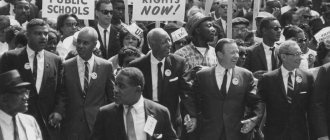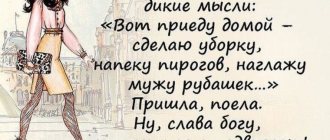Quotes from Stas Karpov
It is impossible to emit the scent of roses while constantly living in manure.
The hedgehogs wept bitterly, but did not dare stop eating the cactus. – Stas Karpov
Corruption did not please them. In modern conditions, it is the only engine for building a new life.
You cannot forgive everyone all the time, then the number of unpunished people will grow progressively, accumulating problems. This is the path to chaos and unrest. – Karpov
Fools are more similar in their inner worldview than in their outward appearance.
If others suddenly stand up for him and listen. Then my headache will begin its slow one-way movement towards your unprotected ass.
Don't worry, it's a new moon today. I peel off my skin, it's always a full moon.
Stas Karpov: Ghouls and vampires are afraid of the ideological exorcist.
You can make money on the plot, I know how. I'm not selling out of principle.
Life is scary, but interesting, although in a single copy for everyone. I’m up to my neck in shit, but I advise and recommend that you get up and move forward.
I was once kind and honest, but someone wanted to dirty me. I had to take the money, cry, but take it again.
Read the continuation of Karpov’s beautiful quotes on the pages:
There were almost 700 assassination attempts on Fidel Castro. How not to overtake the commander...
It's nice that you now turn to patients on You. It turns out that politeness is also a matter of money.
There is only one way to solve all problems in life, but not everyone recognizes it. Violence…
Do you know who you remind me of? A thin girl leading a huge fighting dog on a leash - if something happens, the dog will tear her to shreds.
You don’t have to believe in the living dead, little green men or ghosts, you just have to believe in your own eyes.
If something happens to Antoshin tomorrow, and my guys find out that I could have protected him and didn’t do it, then the day after tomorrow no one will cover my back. And they will be right.
In this world, Antoshin, loners cannot survive.
Do not panic. This is the worst thing. If you don't panic, there will always be a way out.
The main characters of the three series
Sergey Glukharev (Glukhar) – the main character of “Glukhar”, police captain/major, head of the investigation department of the Pyatnitsky police department. Zimina's lover, Denis's friend. He likes to drink, can ruin a business for money, and enjoys the privileges of his official position. The person is generally kind, ready to fight for honesty, justice and for “his own people.” After the tests, he abandons the form and leaves for St. Petersburg (in fact, the actor, Maxim Averin, left the series, which gave rise to two spin-offs).
Irina Zimina is the main character, “Pyatnitsky” major/lieutenant colonel/militia/police colonel. Single mother, Sergei's former lover. In general, the “cunning fox,” as her friend/enemy Stas Karpov called her, is smart, tough, and, it would seem, even kind, but over time her kindness evaporates somewhere (more on that later). He dreams of becoming a judge, but still remains the head of the police department.
Stanislav Karpov is the main character of the series “Karpov” of the same name.
Former police major/lieutenant colonel who lost his job and rank after a crime. Being the head of the criminal police service, he did not disdain any methods in his work. He killed, took the loot, provided protection, and even got involved in various types of criminal activities. After committing a mass shooting, he served three years in a mental hospital and was released as a free bounty hunter. Denis Antoshin is a police lieutenant (from the 3rd episode of the first season - senior lieutenant), traffic police inspector, and from the second season - an investigator of the criminal investigation department of the Pyatnitsky police department.
Glukharev's best friend. From time to time he becomes an alcoholic, then turns into a great spy, becomes an alcoholic again and returns to normal again. Nikolai Tarasov – lieutenant (since the 62nd episode of the third season - senior lieutenant) of justice, investigator of the Pyatnitsky police department. The son of the famous lawyer Viktor Vasilyevich Tarasov, who opposed his son’s work in the internal affairs bodies. Became an investigator at the Main Directorate.
Anastasia Klimenko is the girlfriend (from episode 41 of the third season - wife) of Antoshina. She was a prostitute, in the second season she gets a job at the Homeless Fund and enters medical school. At the end of the story, she gave birth to a son from Karpov, passing him off as Denis’s son, and married a rich man.
Karpov
- Remember, you once said: a step back in order to go forward... But we must admit, this is not our case. We lost. - If only I had thought that once in my life. In the cops, in the mental hospital... or sometime later. If I had just let that thought get into my head, I wouldn't be sitting here right now. It's not a loss. This is a necessary sacrifice. The goal remains.
A demon, when he lives for a long time with an angel... - one of them becomes like the other... - Unfortunately, I don’t know of cases when a demon became an angel.
“But I still don’t know what you are like.” - I envy you.
— It’s interesting to look at your Lerka. - Interesting?
- How interesting. Karpov’s daughter even sounds scary.
- Why do I keep coming back to you? It’s clear that this won’t end well. You are not from my world. Yes, I’m not at all sure that you are from this world. - Not really. I'm just from this world. Only from the dirtiest part of it.
[doorbell rings] - Are you waiting for someone? “I haven’t been waiting for anyone for a long time, except for the psychiatric team, but today I didn’t call them.
I'm often lucky. There are people who are unhappy but lucky. I'm one of those people.
Among the good, I am the good. Among beasts, I am a beast.
The problems of the sheep of the wolf do not soar.
You can't undo what's done. And forgiveness cannot be earned. But you can be worthy of it.
Don't think about bad things before they happen. And if it happens, there will be a lot of time to think about it.
citaty.info
Brief information on the series
So, first, the information, which, if you know what it’s about, you can scroll through. Because it is intended precisely to avoid getting confused in the intricacies of the script while analyzing the story. In general, we are talking about one big story about the same people. That is, the heroes of “Pyatnitsky” are important in “Karpov” and vice versa, events, plots, many characters are intertwined there, and even scenes are repeated one after another. And for all these heroes, the backstory was the series "Capercaillie". Therefore, when focusing on one series, we do not forget that this character is also in other stories.
“Capercaillie” is a 3-season series from 2008-2011. According to Wikipedia, at the time of its release, this series was watched by 40% of television viewers. It is unknown how accurate the information from Wikipedia is, but it was undoubtedly popular. Now on Kinopoisk three seasons in a row have ratings: 7.9, 8.0 and 8.1. Considering the traditionally low ratings for Russian films on Kinopoisk, this is a record result.
“Pyatnitsky” is a spin-off continuation of the series, published from 2012 to 2014 and has 4 seasons. On Kinopoisk it has a rating from 6.8 to 7.2. According to views on YouTube and on average according to reviews, it is the “weakest link” of the trilogy.
"Karpov" has 3 seasons of 32 episodes. Rating on Kinopoisk: 8.2, 8.0 and 7.8.
The franchise also includes several television films, New Year's shows, one movie, special issues, but we will not consider them, since they do not greatly affect the plot.
Stas Karpov
Do you know what oil is? Oil is, first of all, power. We use it to lubricate every lever, every wheel in the system.
Information is never useless!
- Remember, you once said: a step back in order to go forward... But we must admit, this is not our case. We lost. - If only I had thought that once in my life. In the cops, in the mental hospital... or sometime later. If I had just let that thought get into my head, I wouldn't be sitting here right now. It's not a loss. This is a necessary sacrifice. The goal remains.
“But I still don’t know what you are like.” - I envy you.
— It’s interesting to look at your Lerka. - Interesting?
- How interesting. Karpov’s daughter even sounds scary.
- Why do I keep coming back to you? It’s clear that this won’t end well. You are not from my world. Yes, I’m not at all sure that you are from this world. - Not really. I'm just from this world. Only from the dirtiest part of it.
[doorbell rings] - Are you waiting for someone? “I haven’t been waiting for anyone for a long time, except for the psychiatric team, but today I didn’t call them.
I'm often lucky. There are people who are unhappy but lucky. I'm one of those people.
Among the good, I am the good. Among beasts, I am a beast.
Everyone criticizes corruption. And she helps to build and live.
Don't worry, it's not a full moon today - I won't rip off your skin.
citaty.info
"Capercaillie"
The story begins with the fact that Sergei Glukharev’s best friend, traffic cop Denis, falls in love with a prostitute. Because of this, Denis begins to have a ton of problems, and Sergei helps him as best he can. However, Denis commits the murder of yet another pimp of his girlfriend (end of the first season). Because of this, being in a hopeless situation, Denis asks Zimina for help. She takes him to work at the Pyatnitsky police department as an investigator and Denis gets involved in the war of “good” cops against “bad” ones (second season). In this war, the “good” ones are the investigators, and the bad ones are the “operators”. But after the appearance of more dangerous third enemies, including within the police, the warring parties make peace.
In the third season, after a wave of terrible adventures, stories, murders and attempts to hush up these same murders, including by the main characters, each of the employees of the Pyatnitsky police department is slowly going crazy. Denis becomes an alcoholic and leaves his pregnant wife. Sergei leaves the police and makes a video exposing the entire system. Zimina is trying to get a job as a judge, and the position of chief goes to Karpov. However, his people, brought up by him “according to concepts,” begin outright terror, which is why most of the employees leave Pyatnitsky. The distraught Karpov arranges a mass execution of civilians. After which Zimina is asked to return to the department, some of the employees lose their shoulder straps, and some leave the police on their own. This is how the series "Capercaillie" ends.
Official powers
TV series about the police often show how a person uses his official position for his own purposes. Moreover, according to the law of the “Overton Window” - first, the main character Seryozha in the first episode asks his traffic cop friend to take his mother to the doctor. You have to arrive early in the morning, and there are traffic jams in the city. It is better to arrive in a company car with flashing lights. It is so? The option that the mother may not take advantage of the fact that her son and his friend are in uniform and get up early like a mere mortal is not considered. This is a regular trip to the doctor, scheduled in advance.
Further more. Denis comically takes bribes from drivers, Agapov also comically furnishes the entire apartment with confiscated goods and bribes. We learn how most police officers “scrap” on the side - ruining cases for money, providing services outside of work and taking away gratitude in monetary and material terms. And of course, taking the criminals’ profits for themselves.
Moreover, if some kind of “scheme” of such illegal enrichment is discussed on camera, one of the characters will definitely mention that this is the norm: “You didn’t open America to me,” says Zimina. Or: “We need to teach you everything,” says Glukharev, teaching trainee Tarasov about bribery. Moreover, the latter’s resistance is presented as the stupidity of a naive neophyte.
Later it turns out that the opera, it turns out, have huge apartments, good cars with a salary of about 15 thousand. Where? From criminal business, from “protection schemes”, from trading in unaccounted for precious stones and, of course, from caught criminals. The “small ones” are released with a bribe, and the “big ones” are caught for work and rewards. Young and old are doing this, and the difference in moral attitude towards this is only in quantity and arrogance. They say that those who release petty criminal thieves for money are “good”. But those who release drug couriers are “bad.”
General morality - good and evil
Moral theory in screenwriting
In foreign screenplay theory, there is the concept of morality of stories and paths of different moralities, in other words, these are expressive techniques designed to maintain the story in a certain “color”. History can be black and white - the most standard, classic - when there is good and there is evil, which include old fairy tales and detective stories. It can be white-white when the conflicting parties both have high moral qualities, and their conflict is a different understanding of what is right (this most often occurs either in good family films or in Soviet cinema). There is gray and white, when the villain is not so evil, but still worse than good, which also often happens in fairy tales. And many others. And there is the so-called “light black versus black”.
One of the laws of such tropes with black morality is that the main characters must either be lighter and kinder than the villains, or have absolutely bright characters as allies. Then you can make the audience feel sympathy for the scoundrels. Conventionally, the main character shows his family and children, but the villains do not. Or he has a set of principles that separates him from outright and pure evil. The “black-on-black morality” trope was used to make films like Deadpool, Freddy vs. Jason, and the like.
Transformation of franchise morality
So “Capercaillie” from episode 1 of “Capercaillie” to the finale of “Karpov” slowly moves along the shades of morality from light gray to pure darkness. This downward movement occurs carefully and very imperceptibly. That is why the “Overton Window” is mentioned in the context of the article, because the example of “Capercaillie” clearly shows how to move out of gray morality into pure “blackness” without losing the audience.
Season 1 of "Capercaillie" in a gray-gray morality, when there are essentially two conflicting sides that are neither good nor evil. Someone takes a bribe, and someone commits a hooligan attack on a store. Everything is in the world of petty crime, easy sins. But at the same time, in the plot there are many “peaceful” characters, absolutely light, not seen in dark actions. This is Glukharev’s mother, sister, Kolya Tarasov, and many victims.
Season 2 works exactly along the “gray and dark gray” trope. There are two sides to this trope, one of which is gray-neutral, the other is closer to black. They have conflict until the black side appears and they have to make peace against a third enemy. The season begins with an open conflict between the “gray” cops of the main characters and Karpov’s operas with him at the head. We learn that Karpov is very rich, he has a large criminal network from illegal casinos to unaccounted for stones. He justifies himself by the fact that he acts not against people, but against the system. And this is where, excuse me, “trash” begins in the comments. It is difficult to find another word, because under the key episode, when we do not guess, but directly learn that “dark gray” operas can kill “gray” criminals in order to appropriate their deeds and money, one can see entirely positive and enthusiastic comments about these characters and their methods.
Then pure evil appears - Morozov, who also does not hesitate to kill and sells drugs. His colleagues cannot forgive him for this. A confrontation begins in which the entire department rallies against evil. This is explained out loud by the fact that “the enemies here are also family.” In the finale, in despair, Glukharev kills the enemy in secret from the others, and Karpov covers him. Immediately after this story, there are again light, cheerful episodes, as if Glukharev, who, after all, committed a murder, albeit a scoundrel, does not feel the slightest remorse.
One of the most dramatic scenes in the series is the scene after the shooting of a gang of young race car drivers by the operas of Karpov (the one who is a “good man,” let’s not forget). The opera makes it look like a shootout while apprehending criminals and takes all the money from the stolen cars. That night they “baptize” Denis Antoshin into their ranks, giving him a choice. Literally: “to die a hero when detained or make good money” in the ranks of Karpov’s gang. Out of fear, Antoshin takes the money, deceives his friend and confesses everything only to Nastya. He screams in hysterics: “They are the worst gang!”
And in the next episodes... it was as if nothing had happened! He feels good, laughs, has fun with his friend, communicates with Karpov and his people, and comically tries to evade work. The story with the racing drivers emerges only much later and is characterized not by mental trauma, but by banal blackmail of an unexpected witness. There is a brief episode when, a year and a half on-screen after the crime, he gives away the stolen money for treatment, having spoken with a priest beforehand. But this episode of repentance is so small that the viewer will not pay attention to it. It’s as if conscience and mental anguish awaken in the characters once every few years.
At the end of the season, Zimina orders the murder of their common enemy Karpov.
Season 3 becomes darker and more tragic, but now it is not the heroes who face more cruel evil, but they themselves move from the realm of “gray morality” to “dark gray.” Some of the episodes are devoted to covering up some sin of some from others - Karpov reluctantly killed a man in the department - Glukharev and Denis cover for him, Denis almost kills Karpov while drunk - Glukharev and Irina cover for him. Antoshin himself became very friendly with the bandits and largely accepted their mentality and thinking, and even tried to help the gang leader escape.
In “Pyatnitsky,” degradation is already visible in the plot itself, when Zimina first opposes the avengers, then becomes one of them, dividing the blame and complicity among her subordinates through voting. And then he kills his subordinate and at the same time his friend for trying to reveal the truth about what people in uniform do. Moreover, she has enough conscience in an attempt to “pin” this crime on another person, telling him, pressing for pity, how murdered Katya was a good girl. How her mother talked about her graduation and other sweet, pitiful things.
Once again: the main character of the series is supposedly “good.” (For a long time, she was shown to us as a strict, but fair and kind mother for her subordinates and will continue to be shown, but in the end she will not be punished and will be honored in the finale ).
In an attempt to shift the punishment for the murder she committed, she tells the innocent man what a good, kind and beautiful girl she was killed. What is even more terrifying than the torture shown in “Karpov” is some kind of incredible psychological sadism and unimaginable cruelty ( https://youtu.be/2gviMriGk2w?t=1214
).
In “Karpov” , in order to make the murderer and bandit who was imprisoned for a mass execution a hero, it was necessary to make him the enemies of the most black villains - from pimps, murderers and maniacs to pedophile deputies. In addition, according to the covenant of black-black morality, there must be “good” people next to the main character. This is his woman, who was also the victim of his execution - Svetlana. Who forgave and fell in love with him, and her friend’s attempts to reason with her were met by the audience as attempts by an envious woman to destroy love. Moreover, the audience fell for it, admiring the scene where Svetlana, after quite fair words from her friend that living with a criminal and murderer is simply dangerous, kicks her out.
Here are just some of the comments:
Unlike “Pyatnitsky,” there are no other bright (or rather normal) characters in the story - Karpov’s named daughter takes information from prostitutes and writes articles about the intimate lives of famous clients of harlots. The guard, shown as a relatively light-hearted former detective, becomes religious, but for some reason this makes him not a kind person, but a killer - he personally deals with a criminal who has decided to start a new life, and does this by uttering distorted lines from the Bible. Politician Petrov is not far removed from the bandit, Zotov – without comment.
At the end of the story, as mentioned above, Karpov dies heroically, saving a damsel in distress. He is solemnly buried, with an honorary triple salute. Zotov calls him a friend, always ready to volunteer for help (for example, to hide the corpses of a mother and daughter accidentally killed by Zotov). Zimina calls him “a good person.”
It is worth mentioning separately that Karpov received cult status precisely from some television viewers. That's why they dedicated an entire film to him. And the episodes of “Capercaillie” and “Pyatnitsky”, where he is present, are also filled with enthusiastic comments about this character.
And these are the comments under the final episode.
In fact, there is no bottom to this descent into immorality. And if the series had continued further, it is unknown what it would have come to. The boundaries of what is possible and what is approved were constantly shifting. So, in the third season of “Karpov” there was a very strange episode that had an impact on the rest, which was a flashback - an excerpt from the past. In it we learn that while still an opera in the third season, Denis tried to sell a huge package of drugs, for which he almost went to prison. This is justified by the fact that Nastya had an accident and wrecked a good neighbor’s car - this is not only a “film blunder”, because back in the second season Denis was hysterical when he found out about the policeman-drug dealer. He shouted that his relatives were walking along these streets and was ready to punch him in the face. And allegedly a year later he himself turned out to be the same, and because of his neighbor’s slightly damaged car.
In addition, in this episode, a drunken Karpov forces Nastya to have sex, promising to release her husband from investigation. After which his only natural son is born. However, before this, his attitude towards women was one of Karpov’s positive qualities that distinguished him from complete villains, as well as his absolute rejection of drugs. He often reproached his enemies with violence against them, coercion, and behaved gently with his women, which is atypical for such an image. Now “in the law” there is already coercion at the level of “if you sleep, I will release your husband from prison,” which has never been condemned by anyone who knew this situation, including Nastya herself.
One can only guess what lows the main characters would have sunk to if this trilogy had more seasons. To be honest, it’s hard to imagine.
Comparing situations and attitudes towards them
To more clearly see the transition from gray to black morality, let’s simply compare a few moments, both in TV series and in life.
A policeman gets into an accident, people suffer - “Glukhar” and “Karpov”:
The policeman confesses the crime to his colleagues (“Glukhar and “Karpov”):
A policeman commits a crime (“Capercaillie 1” and “Capercaillie 3”):
The policeman is zealous with violence (“Glukhar 2” and “Pyatnitsky”):
And one more point, in my humble opinion, is quite important: this is a comparison of the series and real life. The stories of "Capercaillie" are often references to the crimes of real individuals. The image of Karpov, for example, is based on the notorious Denis Evsyukov. He is a police major, head of the internal affairs department of the Tsaritsyno district, and an operative.
Officially, he is characterized as absolutely positive and disciplined. However, the press, with reference to Evsyukov’s colleagues at the Chertanovo Yuzhnoye police station, noted that once he in . According to rumors, the police department itself was known for “extorting testimony from detainees.” According to the Moskovsky Komsomolets newspaper, part of the team of the Tsaritsyno police department, of which Evsyukov became the head at the end of 2008, took him “with hostility and openly sabotaged him.”
Absolutely the same thing happened in the series - Zimina praised Karpov in the press, he was awarded. But when he became the boss, the war and the collapse of the department began. And then this happened:
For such a crime, life imprisonment seems to the average person to be a completely fair punishment. And not so much a punishment as a guarantee of safety for ordinary people. But in the serial world, the same criminal was allowed to roam free, taking out his aggression on even greater criminals. To have friends, a lover, and what’s even wilder is to have his victim, who, after mental and physical trauma, was locked up for three years.
Yes, the authors of the series tried to justify this whole situation with the alleged insanity, the inner darkness with which he is struggling. Allegedly, pangs of conscience and help to victims. Perhaps Evsyukov also repents, maybe he is a kind and sweet person at heart, but what happened to him in life was just an accidental mistake? Well, it doesn’t happen to anyone!
Let's compare the same situation in cinema and in life: in life, Evsyukov is feared and hated, but in cinema, Karpov is respected and loved, both by the audience and according to the film script.









